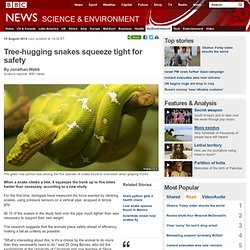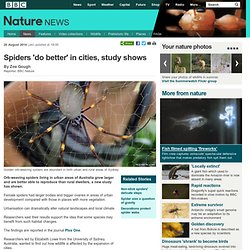

Mouse's midnight snack takes ecology photo prize. Tree-hugging snakes squeeze tight for safety. 19 August 2014Last updated at 19:32 ET By Jonathan Webb Science reporter, BBC News The green tree python was among the five species of snake found to over-exert when gripping trunks When a snake climbs a tree, it squeezes the trunk up to five times harder than necessary, according to a new study.

For the first time, biologists have measured the force exerted by climbing snakes, using pressure sensors on a vertical pipe, wrapped in tennis grip. All 10 of the snakes in the study held onto the pipe much tighter than was necessary to support their own weight. The research suggests that the animals place safety ahead of efficiency, making a fall as unlikely as possible. Continue reading the main story “Start Quote Imagine you want to jump across a stream - by how far do you clear it? End QuoteDr Greg ByrnesAssistant Professor, Siena College, NY Published in the journal Biology Letters, Dr Byrnes' study is the first indication that snakes employ a big "safety factor" when climbing. Pressure ripples. BBC Nature - Spiders 'do better' in cities, study shows. 20 August 2014Last updated at 19:00 By Zoe Gough Reporter, BBC Nature Golden orb-weaving spiders are abundant in both urban and rural areas of Sydney Orb-weaving spiders living in urban areas of Australia grow larger and are better able to reproduce than rural dwellers, a new study has shown.

Female spiders had larger bodies and bigger ovaries in areas of urban development compared with those in places with more vegetation. Urbanisation can dramatically alter natural landscapes and local climate. Researchers said their results support the idea that some species may benefit from such habitat changes. The findings are reported in the journal Plos One. Researchers led by Elizabeth Lowe from the University of Sydney, Australia, wanted to find out how wildlife is affected by the expansion of cities.
The transformation of natural areas can decrease biodiversity but some species are able to benefit from urban development. They build semi-permanent webs which they remain in for their entire adult life. Madagascar pochard, world's rarest bird, needs new home. 25 August 2014Last updated at 19:34 ET By Victoria Gill Science reporter, BBC News The world's rarest bird is on brink of extinction, as Victoria Gill reports The Madagascar pochard, the world's rarest bird, will not be able to thrive without a new wetland home.

This is according to a study revealing that 96% of the chicks are dying at two to three weeks old. Conservationists say that human activity has driven the birds to one remaining wetland, but that that site has insufficient food for the ducks. The research is published in the journal Bird Conservation International. The wetland where the ducks survive is relatively pristine but too deep for young ducklings to dive for food The Wildfowl and Wetlands Trust (WWT), which led the research, estimates that only 25 individual birds now remain in the wild.
Dr Geoff Hilton, head of species research at the WWT, said that with such a small number of birds, keeping a close eye on the population was straightforward. Too deep to dive. Ancient sturgeon in China's Yangtze 'nearly extinct' 15 September 2014Last updated at 02:28 ET Chinese scientists released artificially-bred sturgeons into the Yangtze river in April The Chinese sturgeon, thought to have existed for more than 140 million years, is now on the brink of extinction, according to local media.

Xinhua reported that no wild sturgeon reproduced naturally last year in the Yangtze river. It was the first time since researchers began recording levels 32 years ago. Chinese researches say the fall is due to rising levels of pollution in the Yangtze river and the construction of dozens of dams. Researchers from the Chinese Academy of Fishery Sciences also found that no young sturgeons were found swimming along the Yangtze toward the sea during the period they usually do so. A researcher told Xinhua that in the 1980s, at least several thousand sturgeon could be found in the river. "Without natural reproduction, the fish population cannot replenish itself. Several sturgeon fish are housed in the Beijing aquarium.